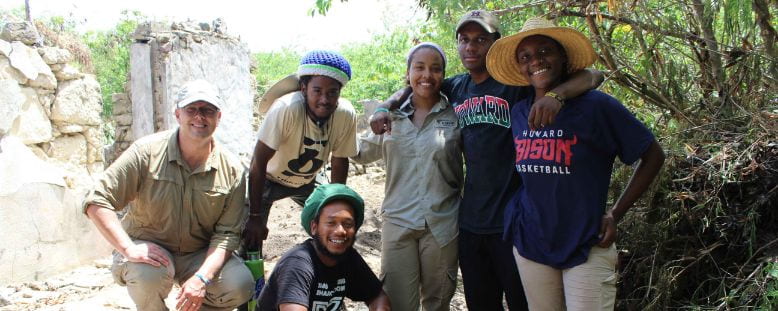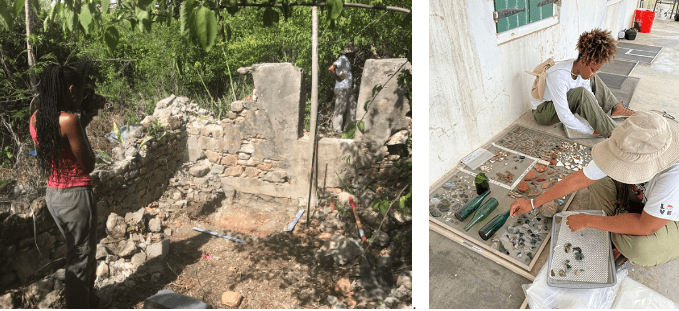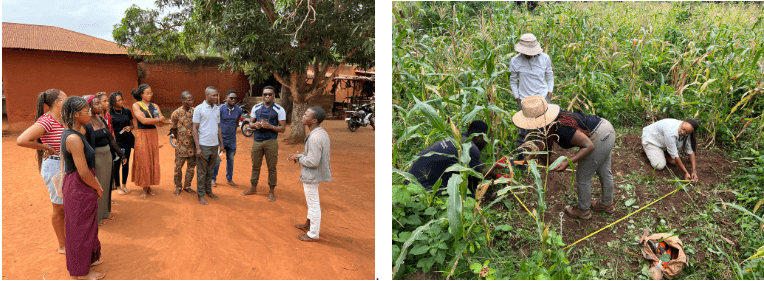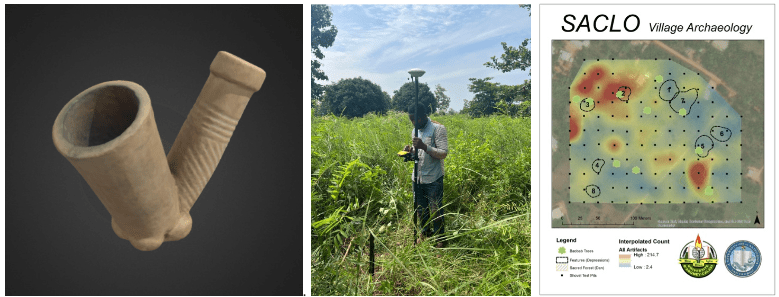
Project Co-Directors J. Cameron Monroe (Left) and Justin Dunnavant (Bottom Left) with students from the 2018 inaugural field season, Estate Little Princess, St. Croix, USVI
UC-HBCU Graduate Pathways Internship in West African and African Diaspora Archaeology
The UC-HBCU Graduate Pathways Internship in African Diaspora Archaeology is a five-week summer training internship program designed to introduce undergraduate students enrolled at accredited Historically Black Colleges and Universities (HBCUs) to the methods and results of archaeological research on African Diaspora sites. Since 2018, interns from multiple HBCUs have participated in archaeological excavations at three sites of key importance to the African Diaspora: 1) Sans-Souci, the royal palace of Henry Christophe located in Milot, Haiti, 2) Estate Little Princess, a former Danish plantation in St. Croix, USVI, 3) Fort Mose, an 18th Century fort established by liberated Africans in 18th century Florida, and 4) Saclo, Bénin, a rural village that emerged on the outskirts of Abomey, capital of the precolonial Kingdom of Dahomey. For the 2024 field season, we will focus exclusively on the site of Saclo, Bénin.
Participating interns gain field experience in interdisciplinary methods for the study of the West Africa and the African Diaspora, and mentorship towards a career in archaeology. The internship is intended to teach students basic excavation, survey and analysis methods while also exposing them to potential graduate level research in archaeology and related disciplines. Interns also receive a stipend, travel expenses (including room and board), and financial incentives for matriculating into a graduate program in the UC System.

Saclo, Bénin
Saclo Village Archaeology, a collaboration between the University of California Santa Cruz and the University of Abomey-Calavi, Bénin, examines the growth, development, and transformation of the village of Saclo on the Abomey Plateau in the era of the trans-Atlantic slave trade. Launched in 2022, Saclo Village Archaeology seeks to understand how villages on the Abomey Plateau adapted to and transformed during the era of the trans-Atlantic slave trade and the rise of the Kingdom of Dahomey. Interns will collaborate with students from the Université d’Abomey Calavi in systematic survey and targeted excavation of the site.

Students will spend one week in residence at UC Santa Cruz, California (July 8th-13th) and another four weeks in Bénin (July 14th-August 10th) doing field work and visiting heritage sites.
At UCSC, students will receive one week of intensive training in artifact analysis and digital archaeological methods from multiple specialists on campus. Particular attention will be devoted to artifact typology and the use of 3D technology to model artifacts and excavations.
Interns will then join participants from the Université d’Abomey Calavi for 4 weeks of survey and excavation at Saclo in Bénin. While in Bénin, interns will apply the methods they have learned in a real archaeological setting, recovering traces of a settlement dating to the era of the trans-Atlantic slave trade, and the rise of the Kingdom of Dahomey.
Interns will also visit important heritage sites in Bénin (Ouidah, Savi, Abomey, Cana), and learn from leaders in the field of archaeology and cultural heritage in Bénin. In addition to fieldwork at Saclo, there may be opportunties to excavate a military training ground associated with the Agojié, famed female warriors of the Kingdom of Dahomey, whose story was recently told in the Hollywood film The Woman King.

Former Student Testimonials
“My summer internship with the UC-HBCU Fellowship program showed me how collaborative archaeological work is. Although we were trained specifically as archeologists we were encouraged to engage this work through our foundational training as historians, sociologists, and architects.” – Marquis Taylor, Howard University (undergrad) & Northwestern University (Ph.D.), 2018 & 2019 Fellow.
“Summer 22′ was iconic. I was given the opportunity to travel to places that I’d never even imagined going to. Having this archaeological internship allowed me to meet amazing people and experience different cultures and practices. Spending one week in California, three weeks in St. Croix, and three weeks in Benin, I’ll forever be grateful for what I learned. It was a step outside of my comfort zone, but it was one that I’m happy that I made.” – Jaresia Elliott, University of the Virgin Islands, 2022 Fellow.
“As a historian, this archaeology internship was the perfect opportunity for me to apply my critical thinking skills and work towards a common goal with many scholars and community members. From classroom preparation to the soil digging, this UC-HBCU internship was great exposure to the life of an archaeologist.” – Jasmine Mitchell, Fisk University, 2022 Fellow.
Intern Compensation
- $4000 summer stipend ($800 per week)
- Fully funded travel expenses (flights, room and board)
- Competitive financial incentives to attend graduate school in the 10-campus University of California system
Eligibility
- Must be enrolled at an accredited HBCU at the time of application
- Must comply with all vaccine requirements of the Republic of Bénin, and the University of California
- No prior archaeological experience is necessary
How to Apply
Please complete an application, and provide all necessary supporting documentation by the deadline. This includes:
- A 1,000-word essay that outlines your academic background, interest in archaeology, and how this experience will contribute to your academic and career goals.
- An unofficial transcript.
- One letter of recommendation from a professor who can speak to your academic interests and abilities.
- A resume/CV outlining your work experience (academic or otherwise).
The deadline for submission of all application materials is 5 pm on Sunday, February 18th, 2023. Materials received after this deadline cannot be guaranteed consideration. For more information contact Dr. J. Cameron Monroe (jcmonroe@ucsc.edu) or Dr. Justin Dunnavant (jdunnavant@anthro.ucla.edu).